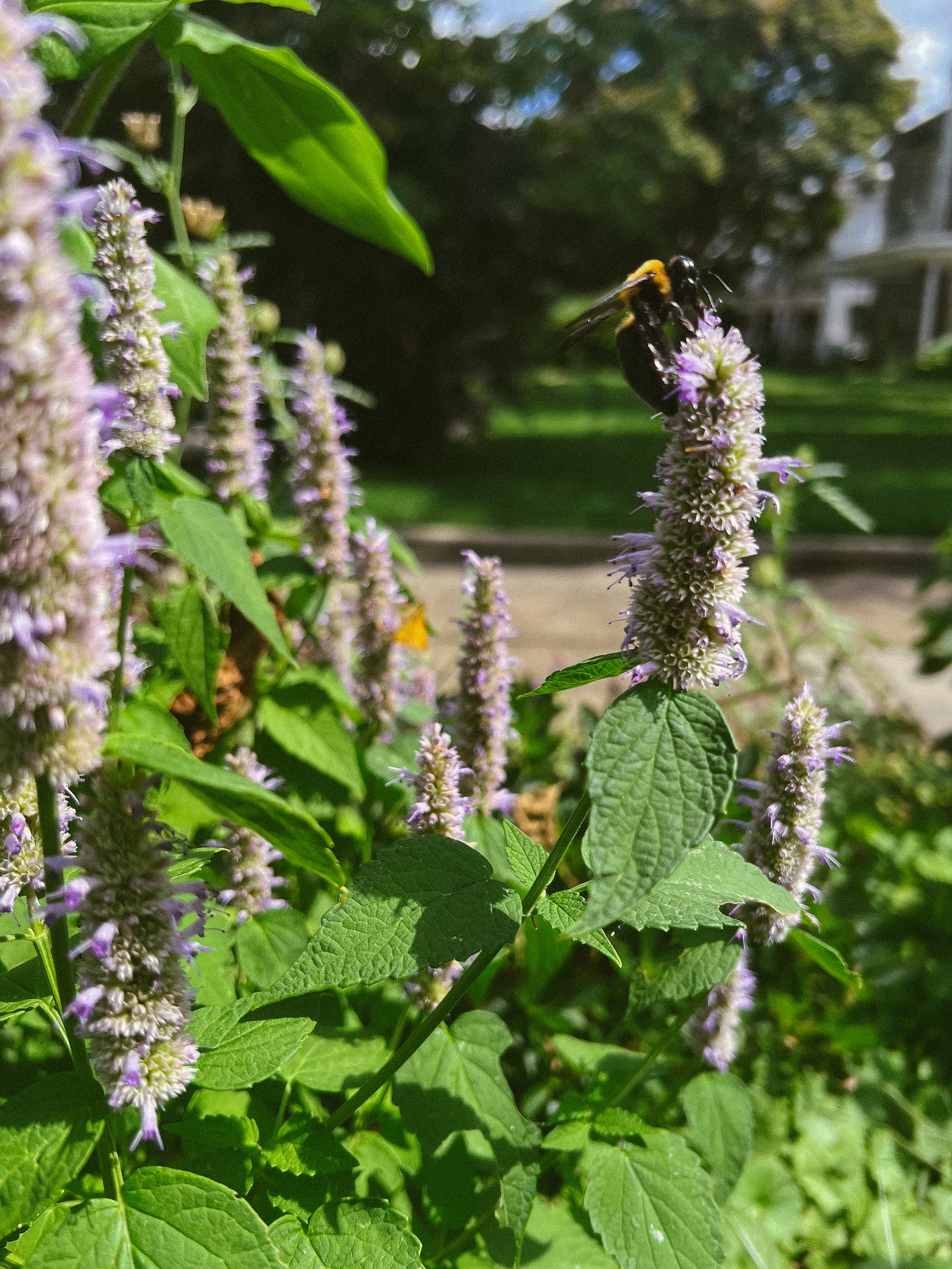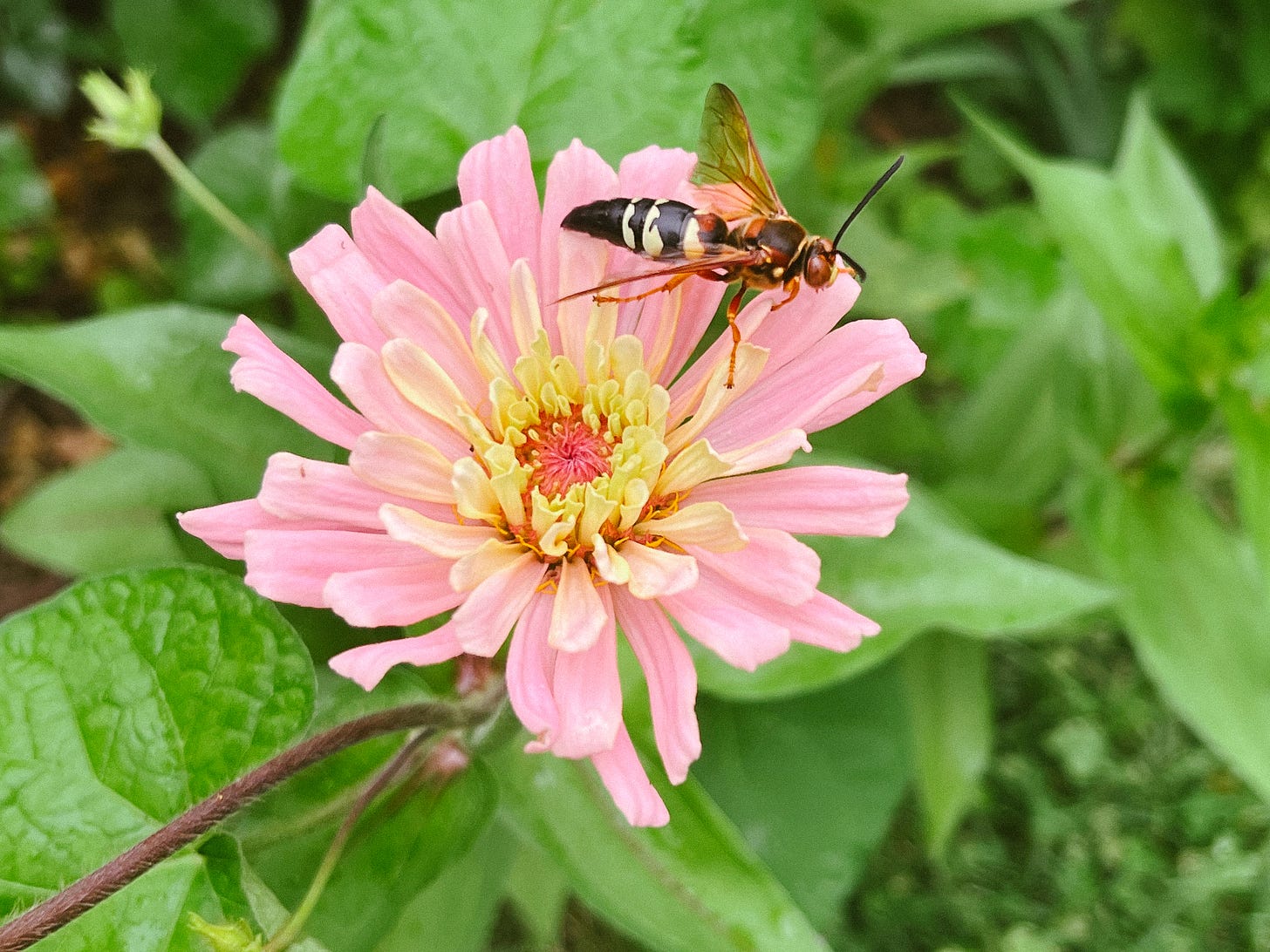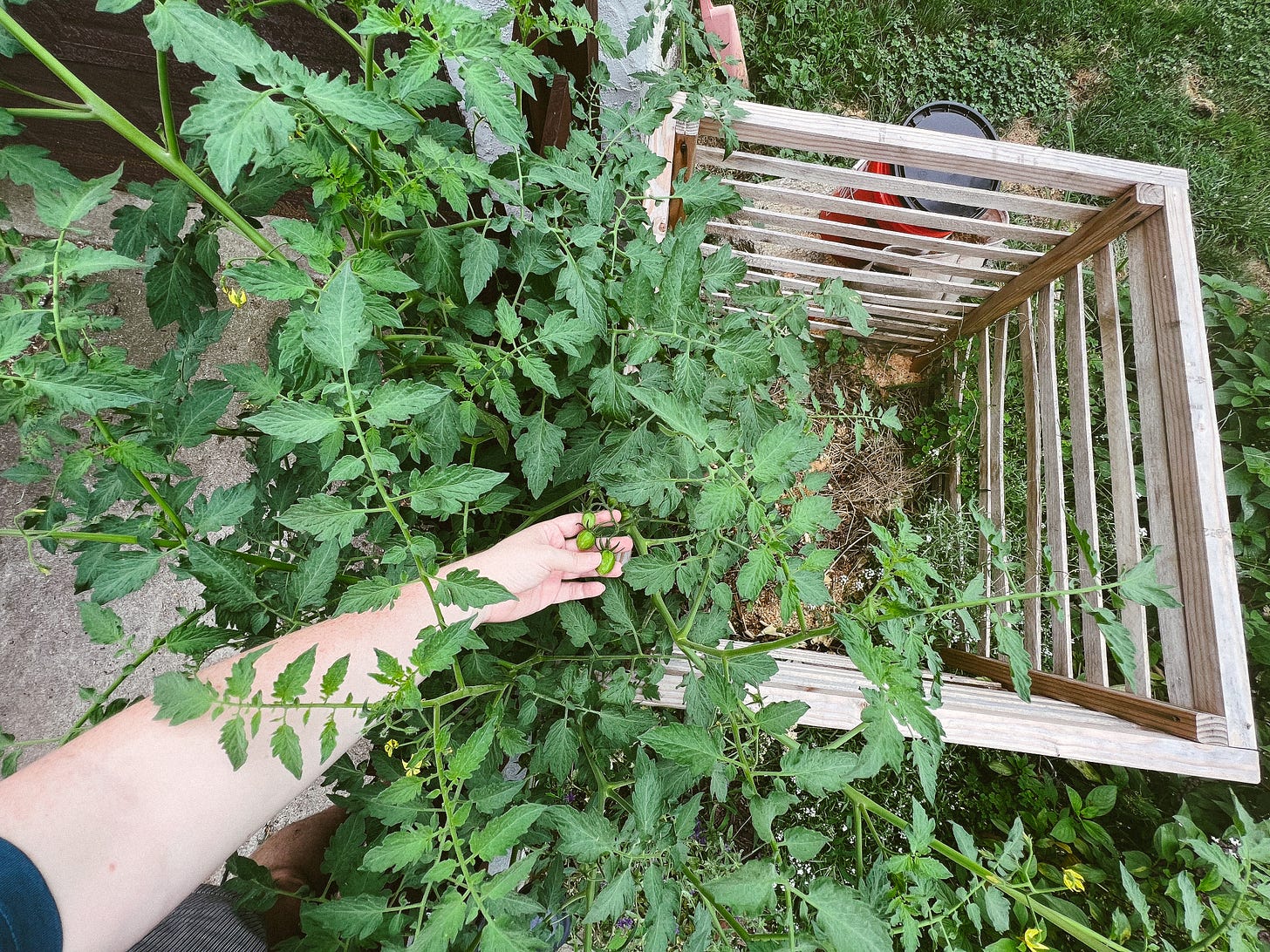On The Small Things Where Hope Lives
featuring photographs of some bugs I have met lately
I can be very critical, and it gets exhausting. I don’t want to be a person that just picks everything apart all the time, but in some ways I can’t help it. Questioning is sort of my mind’s default mode. Lately I’ve been trying to pull myself back from the edge of nihilism and find some kind of hope again, because while critiquing the systems we live in is necessary, it’s not sustaining.
That hope is coming to me in the form of insects. In January, I started planning a pollinator garden; now at the end of August, despite the plan going awry (as plans always do), the flowers are here and with them, the bugs.
On a street full of cut lawns, my mix-and-matched, unpruned plantings look weird enough that they stop people on the sidewalk. Two older women out for a stroll pull out their phones and snap a few pictures. A curious little girl with her mom grabs a fistful of yarrow, but stops short of yanking it from the dirt. I think there’s something about the constant movement of the bugs that stops a person in their tracks. The frenzy of life is irresistible.
Sometimes I sit in the grass for a while and just watch the activity — three different kinds of bees, two kinds of moths, a whole bunch of cabbage butterflies. I found a bumblebee sleeping inside a zinnia one quiet morning, and a cicada killer has been visiting in the afternoons. She followed me into the house one day and I screamed, because I’d never seen a wasp so big in my life. Patiently she waited on the window until I could get over myself and let her outside again.
I saw a goldfinch for the first time this month — two, actually. A bright yellow male and a brown female, perching on the zinnias. He was munching away at a flower head that had faded, petals hanging out of his mouth. I’d been reading about bird-friendly plantings for months, of course, so theoretically I knew they would show up, but it hadn’t really felt real until I saw the goldfinches.
It’s hard to know the effect your actions will have over time. A child in a culture of immediacy, thinking long-term was not something I learned to do. But the plants are teaching me to imagine six months, two years, five. To have faith that what is small will establish, and what goes dormant could come back if given enough time. We lack the ability to photosynthesize, Robin Wall Kimmerer points out, so we have a lot to learn from the plants, who know more than we do about living on a planet powered by the sun.
Critique is easy — I fall into it unthinking. Hope is the hard thing. It’s difficult to be so painfully aware of how small I am on a planetary scale and believe that my actions still matter despite this. A capitalist economy alienates us from so much — the earth, each other, but also the effects of our efforts. In his argument about why bullshit jobs make us feel so bad even though they’re technically easy, David Graeber argued that it’s the ability to see our effects on the world that makes us feel human, citing the work of psychologist Karl Groos, who called it “the pleasure at being the cause.”
It’s easy to see how a lack of this kind of pleasure combined with a bit too much critical systemic doomerism could lead to apathy. I’ve been thinking about something Joshua P. Hill wrote recently in response to the binary of rhetoric that’s emerged between individual responsibility and systemic critique:
“It’s not one or the other, it’s not the personal or the systemic, it’s the personal oriented towards the systemic, and empowered to be a part of the collective force to change the world at scale.”
Sometimes it takes directly observing an effect that you’ve had on a system to reinstill hope in your own actions. I’ve been trying to reorient myself in the system of nature, to act within it and not above it — nature is not over there, nature is me. Composting has revealed a system to me that I have always been part of, made up of microscopic beings with great powers of transformation that I do not possess alone.
My own body, quite literally, is a system of these beings. As Cass Marketos told me recently, composting is just tapping into something that is happening in and around us all the time, that we were never really separate from in the first place.
At first I thought it was an insignificant thing, a small ritual I was doing to console myself in the face of climate horrors. But then I forgot to take the trash out one week, and realized that the garbage can, which used to be filled to the brim after seven days, was only half-full now. I had read that composting cuts greenhouse gas emissions by 50%, but that number was abstract to me — seeing the effect in my own garbage can, like seeing the goldfinches, made it real. I can’t believe I’ve lived three decades so dissociated from this system around me, neglecting my own responsibility within it.
The compost pile takes trash and gives us back whole entire plants — I’ve found hope in a rogue tomato growing enthusiastically out the side of the bin, with thick stems so verdant they stain my fingers green. Some consider hope naive, but Rebecca Solnit reminds us that hope does not preclude grief or overlook harsh realities. It’s difficult because it must exist in spite of these things, somewhere in the gray area of uncertainty:
“Hope is an embrace of the unknown and the unknowable, an alternative to the certainty of both optimists and pessimists. Optimists think it will all be fine without our involvement; pessimists take the opposite position; both excuse themselves from acting. It’s the belief that what we do matters even though how and when it may matter, who and what it may impact, are not things we can know beforehand. We may not, in fact, know them afterward either, but they matter all the same, and history is full of people whose influence was most powerful after they were gone.”
The pleasure at being the cause is addictive. As the weather cools, we’ll dig up more sod and plant viburnum, tuck in little bluestem, and spread out the wrinkleleaf goldenrod. The swallowtails have come around, but I haven’t seen any monarchs, so we’ll have to add a patch of swamp milkweed, too. Every day, the goldfinches, carpenter bees, and moths are telling me that this little patch of plants I tend is not insignificant; the microbes turn my garbage into gifts.
Keep going, they say. What else can you do?






I hope you take "pleasure at being the cause" with your writing - everything I read of yours makes me feel less alone. You also make me really want to garden even though I'm terrible at it and my only outdoor space is a little balcony 🌱
I teared up reading this - I have a hard time turning off the critic in my head, and when I can't un-see systemic problems, things get heavy. Finding ways to take "pleasure at being the cause" is a really lovely way to shift my thinking! I have been seeing a cardinal pair show up outside my window for the last couple of weeks, so this is a good reminder to leave my sunflowers to go to seed, in case they'd like a snack.